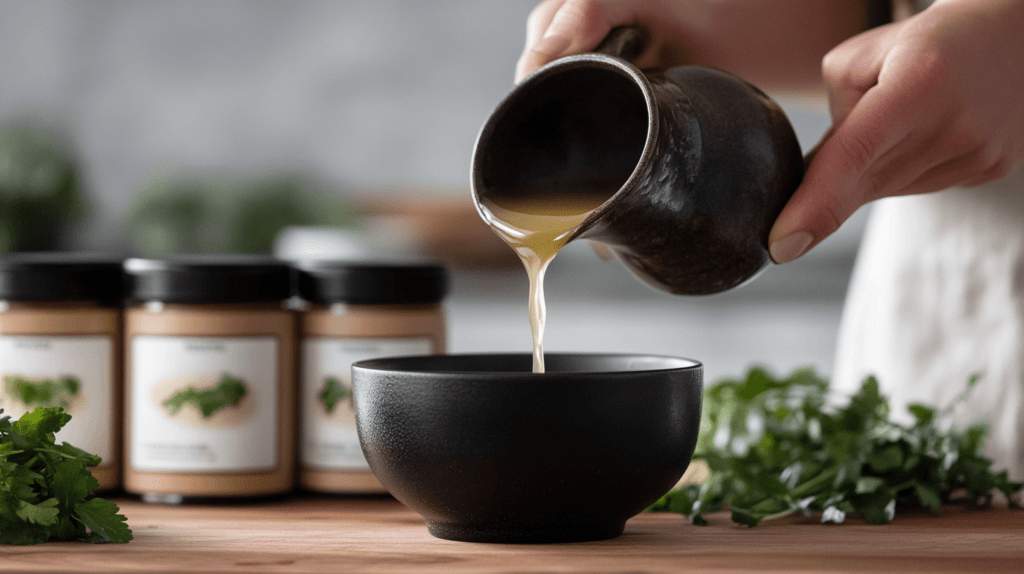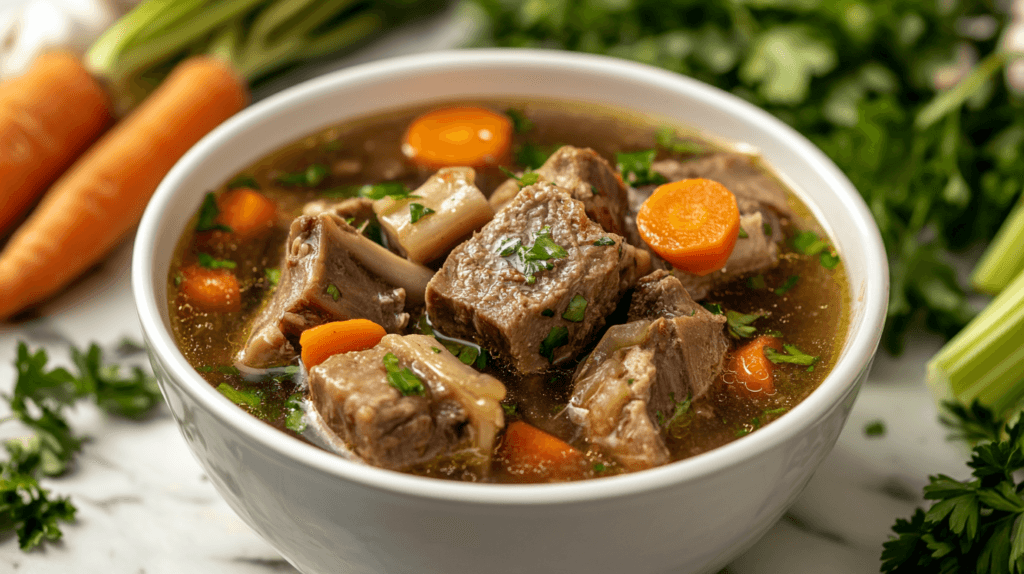Bone broth has become a staple in many health-conscious diets, celebrated for its rich nutrients and purported benefits for gut health, joint support, and immune function. However, some may wonder, is bone broth hard on the kidneys? Concerns occasionally arise about its effect on kidney health, as the kidneys play a vital role in filtering blood and maintaining overall bodily equilibrium. Certain dietary choices can strain or support their function. But does bone broth belong to the “strain” category? Let’s explore whether bone broth is hard on the kidneys, diving deep into its components, its potential effects, and how to consume it safely.
Table of Contents
Understanding Bone Broth
What is Bone Broth?
Bone broth is a nutrient-dense liquid made by simmering animal bones (such as chicken, beef, or fish) with water, vegetables, and seasonings for extended periods. The process extracts collagen, minerals, and other beneficial compounds from the bones and connective tissues, creating a flavorful and nutritious broth.
Nutritional Composition of Bone Broth
Bone broth contains a variety of nutrients, including:
- Collagen and Gelatin: Known for supporting skin, joints, and gut health.
- Minerals: Such as calcium, magnesium, phosphorus, and potassium.
- Amino Acids: Including glycine and proline, which contribute to protein synthesis and tissue repair.
- Electrolytes: Sodium and potassium, essential for hydration and cellular function.
The nutritional profile can vary based on the ingredients and cooking method used.
Health Benefits of Bone Broth
Bone broth is often associated with several health benefits, including:
- Joint Support: Thanks to its collagen and gelatin content.
- Gut Health: The amino acids may assist in maintaining a healthy gut lining.
- Immune Boosting: The minerals and amino acids can help support overall immune function.
The Function of Kidneys and Their Role in the Body
Overview of Kidney Functions
The kidneys are essential organs responsible for filtering blood, removing waste, and balancing electrolytes. They manage fluid balance, regulate blood pressure, and assist in the production of red blood cells.
Factors That Affect Kidney Health
Several factors influence kidney health, including:
- Hydration: Dehydration can strain kidney function.
- Diet: Diets high in sodium or protein can put stress on the kidneys.
- Medical Conditions: Chronic kidney disease (CKD), diabetes, and hypertension are common factors that contribute to kidney problems.
The Role of Diet in Supporting Kidneys
A balanced diet that is low in excess sodium and harmful substances helps maintain kidney function. Foods high in antioxidants, like fruits and vegetables, also support kidney health.
Bone Broth and Kidney Health: Understanding the Connection
Does Bone Broth Contain Substances That Could Be Harmful to the Kidneys?
Bone broth is generally safe for most individuals, but its components—such as sodium and protein—may require caution for those with kidney concerns. Consuming too much sodium can lead to water retention and high blood pressure, both of which put strain on the kidneys.
Sodium Levels in Bone Broth and Their Impact
Some store-bought bone broths are high in sodium, which may pose a risk for people with kidney disease or hypertension. Choosing low-sodium options or preparing your own broth at home can help reduce this risk.
Protein Content and Its Effect on the Kidneys
Bone broth is not excessively high in protein compared to other protein-rich foods, but its amino acid content can contribute to the overall protein intake. For individuals with advanced kidney disease, managing protein consumption is crucial, as too much protein can increase strain on the kidneys.
Bone Broth’s Benefits for Kidney Function
Bone broth’s mineral content, especially potassium and magnesium, may help maintain electrolyte balance, which is important for kidney health. However, moderation is essential.
Bone Broth: Weighing the Benefits and Risks for Kidney Health
Bone broth is commonly considered a superfood because of its nutrient-rich composition. However, its effects on kidney health depend on various factors. Let’s explore both the benefits and potential risks in more detail:
Benefits of Bone Broth for Kidney Health
- Electrolyte Support: Bone broth contains potassium and magnesium, essential for maintaining proper electrolyte balance. These electrolytes assist the kidneys in regulating fluid levels and ensuring proper muscle and nerve function.
- Gut and Immune Health: The collagen and amino acids in bone broth may indirectly support kidney health by promoting a healthy gut lining and reducing inflammation, which is beneficial for overall systemic health, including the kidneys.
- Hydration Assistance: When consumed as part of a balanced diet, bone broth contributes to daily fluid intake, supporting the kidneys in flushing out waste and toxins effectively.
Potential Risks of Bone Broth for Kidney Health
- High Sodium Content: Many store-bought bone broths are high in sodium, which can worsen conditions like water retention, hypertension, and kidney strain, particularly in individuals with existing kidney disease.
- Excess Protein Load: Bone broth contains amino acids such as glycine and proline. While beneficial in moderation, excessive protein intake can increase the workload on the kidneys, particularly in those with compromised kidney function.
- Contaminants: If bones from non-organic or poorly sourced animals are used, bone broth may contain heavy metals like lead, which could potentially harm kidney function.
Striking the Right Balance
To enjoy the benefits while minimizing risks:
Pair bone broth with a kidney-friendly diet that includes fresh fruits, vegetables, and low-protein options when needed. For healthy kidneys, the benefits typically outweigh the risks when consumed in moderation.
Choose homemade bone broth to have better control over the sodium content and quality.
Consume it in small amounts, particularly if you have existing kidney issues.
Promoting Kidney Health Beyond Bone Broth

While bone broth may provide some benefits, kidney health depends on a wider range of dietary and lifestyle choices. Focusing on these other factors can improve kidney function and overall well-being:
Dietary Strategies for Kidney Health
- Reduce Sodium Intake: Too much sodium can cause high blood pressure and fluid retention, both of which put stress on the kidneys. Choose fresh foods over processed ones and use herbs and spices instead of salt to add flavor.
- Eat Antioxidant-Rich Foods: Include foods like blueberries, cranberries, and leafy greens, which combat oxidative stress and inflammation, supporting healthy kidney tissue.
- Limit Processed Protein Sources: While protein is essential, excessive intake, especially from processed meats, increases the production of nitrogenous waste, making the kidneys work harder.
Hydration as a Priority
- Drink Enough Water: Staying hydrated is one of the simplest ways to support kidney function. Water helps flush toxins and prevent kidney stones.
- Avoid Sugary Drinks: High sugar intake from sodas or energy drinks can damage kidney health over time.
Regular Exercise
Physical activity promotes overall circulation, reducing the risk of hypertension and diabetes—two major contributors to kidney disease. Even light daily exercise, such as walking, supports kidney health.
Monitor Medication and Supplements
- Avoid Overuse of Painkillers: Nonsteroidal anti-inflammatory drugs (NSAIDs) can harm kidney function if used excessively.
- Consult Before Supplements: Some supplements, especially those high in protein or certain minerals, can strain the kidneys if not taken appropriately.
Proactive Medical Care
- Regular Checkups: Monitoring kidney function through routine blood and urine tests can help identify potential issues early.
- Manage Chronic Conditions: Proper control of diabetes and hypertension significantly reduces the risk of kidney damage.
By incorporating these practices, you can create a kidney-friendly lifestyle that complements, rather than relies entirely on, the consumption of bone broth.r optimal kidney function.
Who Should Be Cautious About Bone Broth?
People with Chronic Kidney Disease (CKD)
Those with CKD often need to follow specific dietary restrictions to manage waste product buildup in the blood. Although bone broth is a nutrient-dense option, its sodium content and mineral levels may require adjustment.
Sodium-Sensitive Individuals
Individuals prone to high blood pressure or fluid retention should be cautious about bone broth’s sodium levels, especially store-bought varieties.
Other Risk Groups
Individuals with specific dietary restrictions or medical conditions, such as gout (where purine-rich foods may worsen symptoms), should consult a healthcare professional before consuming bone broth.
Safe Ways Including Bone Broth in Diet

Bone broth can be a nutritious addition to your meals when consumed thoughtfully. Here’s how to enjoy it without putting extra strain on your kidneys:
Choosing Low-Sodium Bone Broth
One of the primary concerns with bone broth is its sodium content. Opt for:
- Homemade Bone Broth: Making it at home allows you to control the ingredients and minimize or completely omit added salt.
- Low-Sodium Store-Bought Options: Numerous brands now provide low-sodium or no-salt-added versions.
Portion Sizes and Moderation
Moderation is key to avoiding excessive sodium or protein intake. Limit your intake to one serving (approximately 8 ounces) per day or less, based on your dietary requirements and kidney health condition.
Pairing Bone Broth with Kidney-Friendly Foods
Enhance bone broth with kidney-friendly foods, such as:
- Leafy Greens: Spinach or kale for added vitamins and minerals.
- Low-Potassium Vegetables: Opt for carrots or zucchini if potassium levels are a concern.
- Whole Grains: Include brown rice or quinoa to create a balanced meal.
Misunderstandings and Myths About Bone Broth and Kidney Health
Addressing common myths helps clarify whether bone broth is suitable for everyone:
“Bone Broth Is Always Bad for the Kidneys”
This myth stems from concerns over its sodium and protein content. Although consuming bone broth in excess could potentially strain the kidneys in sensitive individuals, moderate intake is generally safe for most people and may even provide health benefits.
“Bone Broth Is Perfectly Safe for Everyone”
Though generally nutritious, bone broth isn’t ideal for everyone. Individuals with kidney disease, high blood pressure, or specific dietary restrictions should approach it with caution and consult a healthcare professional.
Frequently Asked Questions
Can people with kidney issues drink bone broth?
Yes, but with modifications. Low-sodium bone broth, when consumed in small amounts, can be part of a kidney-friendly diet. It’s advisable to consult a dietitian for personalized guidance.
Does bone broth cause kidney stones?
Bone broth itself doesn’t directly cause kidney stones, but broths made from animal bones may contain high levels of purines, which can raise uric acid levels and potentially contribute to stone formation. To reduce this risk, stay hydrated and choose bone broth prepared with low purine content. For more information on how to make kidney-safe broth, learn about what not to add to bone broth.
How can you make bone broth kidney-friendly?
To make kidney-friendly bone broth:
- Use low-sodium or no-salt-added recipes.
- Add herbs such as parsley, which can help support kidney health.
- Strain out excess fat after cooking.
Check out this for inspiration on crafting a versatile and nutritious broth that aligns with health-conscious practices.
Explore this chicken bone broth recipe guide for inspiration on creating a versatile and nutritious broth that supports healthy eating habits.
Is store-bought bone broth safe for kidney health?
Not all store-bought bone broths are the same. Many brands contain high levels of sodium, which can worsen kidney problems. Be sure to read product labels and choose low-sodium options. Comparing both liquid and powdered store-bought broths can also help you find the best option. Refer to Bone Broth: Liquid or Powder? for a detailed comparison.
What are the alternatives to bone broth for kidney health?
For those who need alternatives, consider:
- Vegetable Broth: A low-sodium option rich in antioxidants.
- Herbal Teas: Chamomile or ginger teas offer soothing hydration.
- Clear Soups: Broth-based soups made with kidney-friendly ingredients.
Conclusion
Bone broth is a nutritious and flavorful choice with numerous health benefits, but its effect on kidney health largely depends on how it’s prepared and consumed. While monitoring sodium and protein intake is important for certain individuals, moderate consumption of low-sodium bone broth is typically safe for healthy people. With the right adjustments, it can even contribute to overall wellness.
Always consult a healthcare professional or dietitian if you have concerns about how bone broth fits into your specific health needs, especially if you’re managing kidney-related conditions.

